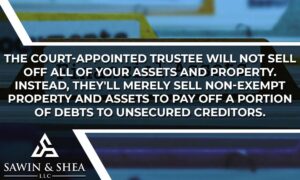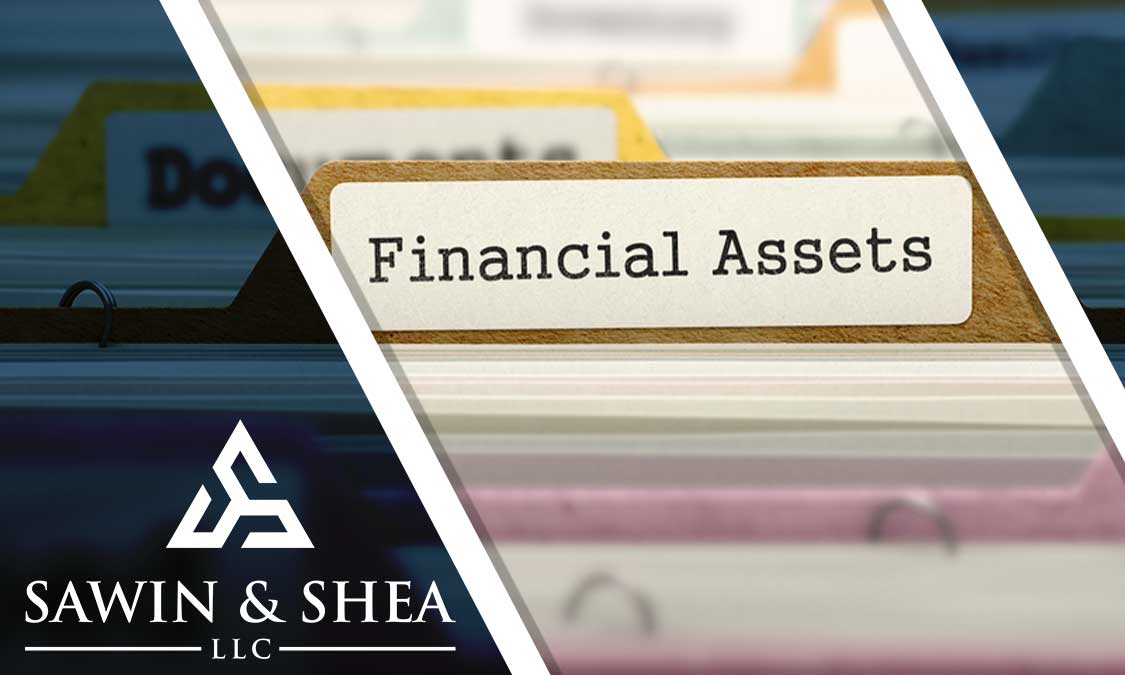Chapter 7 bankruptcy is a great financial solution for those struggling with debt, especially unsecured debts. With Chapter 7 bankruptcy, you as the debtor can discharge most unsecured obligations after liquidating nonexempt assets.
Because Chapter 7 involves a Chapter 7 Trustee selling off certain non-exempt assets, many who consider this bankruptcy method worry about what assets and possessions they can retain. Fortunately, the vast majority of those filing are able to keep all of their possessions.
That said, no two bankruptcy cases are the same, and your Chapter 7 liquidation process will depend on your individual circumstances. Though most Chapter 7 cases are what we callf “no-asset cases” meaning you keep all of your possessions. To fully gauge what you may lose, it’s best to get in touch with a bankruptcy attorney who can give advice and guidance as you undergo your bankruptcy filing to discuss your personal assets.
For experienced bankruptcy lawyers in Indiana, contact Sawin & Shea, LLC. We’ll help you understand what personal property and other assets you can keep and identify assets that may be at risk, and we’ll guide you through the entirety of your bankruptcy case.
In this blog, we discuss what assets and property a debtor may lose in Chapter 7 bankruptcy. We’ll unpack the difference between an exempt and non-exempt asset, and we’ll discuss what debts you can discharge.
What Is Chapter 7 Bankruptcy?
Chapter 7 is also known as liquidation bankruptcy because it involves liquidating (selling off) non-exempt assets belonging to the debtor to repay creditors and lenders. The bankruptcy trustee will sell your non-exempt assets to pay a portion of your debts to creditors. You’ll then be able to discharge the balance of eligible debts, such as credit card debt and medical bills.
You’ll need to complete the bankruptcy process before discharging your debts, but filing has immediate benefits, including an automatic stay. The automatic stay prohibits creditors and lenders from attempting to recover what you owe. They cannot take legal action against you or seize your assets.
Chapter 7 Means Test
Not every debtor is eligible for Chapter 7 bankruptcy, and higher-income earners are less likely to qualify. As part of the bankruptcy paperwork process, your attorney will run an income-based test called the Means Test. This is a test that determines if you are eligible for a Chapter 7 bankruptcy. If you are not, this test determines how much you are required to pay back to your unsecured creditors in a Chapter 13 reorganization.
Indiana’s median income changes from year to year. As of 2024, the annual median incomes are as follows:
- 1 Member Household – $60,351
- 2 Member Household – $77,580
- 3 Member Household – $91,431
- 4 Member Household – $105,581
- and add $9,900 for every additional family member
If your income is beyond these limits, you’ll need to complete the means test before filing. This test calculates your disposable income by evaluating your earnings compared to your essential expenses.
There are calculators online, but it’s best to consult with a bankruptcy attorney to ensure you calculate your disposable income accurately. If you file a bankruptcy petition and it turns out your income is too high, the bankruptcy court will dismiss your case.
Some useful documents and information you should bring to your attorney as a debtor to calculate whether you’re eligible for Chapter 7 bankruptcy include:
- Income taxes
- Child care expenses
- Alimony and child support information
- Information regarding your mortgage and car loans
- All of your sources of income
- Your spouse’s income
- Unemployment benefits
- Workers’ compensation benefits
- Indiana government income
In addition to this test, prospective filers must also meet another qualification. They cannot file for Chapter 7 bankruptcy if they’ve already filed within the past eight years. Fortunately, you might be able to file Chapter 13 instead.
Reaffirming Debts in Chapter 7 Bankruptcy
Chapter 7 bankruptcy allows you to discharge your unsecured accounts, but you cannot do away with a creditor’s a security interest, meaning a debt with collateral must either get paid or the collateral property surrendered. Mortgages and car loans are both considered secured debts because they both have backing collateral.
Although you can’t eliminate your mortgage or car loan in Chapter 7 bankruptcy and hold onto the collateral, you can reaffirm these debts. When you reaffirm a debt, you’re essentially agreeing to be liable for the account again despite your bankruptcy.
Your mortgage and car loan lenders will likely be fine with you reaffirming these debts as long as you aren’t behind on payments and the collateral is properly insured. You’ll be able to keep your asset because you’ve reaffirmed your intention to pay off this debt.
Credit Counseling
Before you file your Chapter 7 bankruptcy petition, you’ll need to complete a credit counseling course through an approved counseling agency. The U.S. Bankruptcy Code requires debtors to complete credit counseling courses 180 days before filing.
Filing Your Chapter 7 Petition

After completing credit counseling, your attorney will help you fill out and eventually submit all necessary Chapter 7 bankruptcy forms. These forms will help the bankruptcy court understand your financial situation and why you need to file.
You’re under no legal obligation to have an attorney help you with these forms, but having a legal professional assist you can make the process easier and help you avoid serious issues. Bankruptcy is a complicated process and not understanding the process can lead to serious problems that can lead to a denial of discharge, loss of assets, and dismissal of your case.
Once complete, you’ll file your bankruptcy petition, and you’ll need to pay a filing fee.
The Bankruptcy Trustee
When you file Chapter 7 bankruptcy, the court will assign a trustee to your case. This trustee will be in charge of your bankruptcy estate. They will assess your financial information and debts, and they will inform your creditors about your bankruptcy status.
The bankruptcy trustee is also responsible for selling a debtor’s nonexempt assets to repay creditors.
The Meeting of Creditors
Your court-appointed bankruptcy trustee will organize your 314(a) meeting, also called the meetings of creditors. Here, the trustee and any creditors who attend can ask you questions under oath about your finances to ensure you were honest in your bankruptcy petition.
After the meeting, you’ll need to complete an approved financial management course. These courses are intended to educate debtors so that they don’t make the same mistakes that led to their bankruptcy.
Will the Bankruptcy Trustee Sell All of My Personal Property?
The court-appointed trustee will not sell off all of your assets and property. Instead, they’ll merely sell non-exempt property and assets to pay off a portion of debts to unsecured creditors.
Fortunately, exempt assets include necessities, as the liquidation process isn’t supposed to deprive you of property that’s necessary to live and work. We’ll go into great detail about exact Indiana exemptions including non-exempt property and exempt property later in this blog, but let’s first discuss what assets a debtor may potentially lose in Chapter 7 bankruptcy.
What Assets Can I Lose In Chapter 7 Bankruptcy?

Bankruptcy law states that any non-exempt assets can be sold off to pay creditors.
Common types of assets and nonexempt property a debtor could potentially lose in Chapter 7 bankruptcy include:
- Vacation properties
- Investment accounts
- Stocks and bonds
- Rental properties
- Luxury items
- Valuable artwork
- Jewelry
- Antiques
- Lien free vehicles
- Electronics
- Musical instruments
- Real estate.
If you have a great deal of non-exempt assets and own your home, you likely will want to consider Chapter 13 rather than Chapter 7 bankruptcy. That way, you create a payment plan based on your income. You’ll make monthly payments over the course of three to five years, and you’ll be able to keep all of your assets, including your real estate properties and vehicles.
What Are Exempt Assets in Chapter 7 Bankruptcy?

Bankruptcy exemptions in Chapter 7 allow filers to retain certain assets. These exemptions differ from state to state, and federal bankruptcy exemptions are also available in some states. In this section, we’ll detail what assets and property a debtor will be able to keep.
Does Indiana Use Federal Exemptions in Bankruptcy?
Indiana has its own state exemptions, and Indiana residents must abide by these exemptions rather than federal exemptions outlined in the U.S. Bankruptcy Code.
It’s also important to note that new residents may not be able to access Indiana exemptions. A debtor must have lived in Indiana for 730 days before filing in order to benefit from the state exemptions. If a debtor lived in Indiana for less than 730 days before filing, they must follow the asset exemptions of the state where they lived previously.
Indiana Homestead Exemption
The Indiana homestead exemption enables the person filing Chapter 7 to keep a portion of their home’s equity. This will also apply to personal property that classifies as a residence, such as a mobile home.
An important note is that this exemption only includes property that is your primary residence. You cannot use this exemption to protect an asset such as a rental property or vacation home.
The exemption amount is $22,700 of equity in property or real estate. You can also double this amount to $45,400 of equity protection if you’re married and filing jointly. Your spouse must co-own the home in order to double the equity protection.
Unfortunately, you cannot double your exempted amount if you have a non-filing spouse, but if a spouse is on the real estate with you a special exemption could apply.
Indiana Personal Property Exemption
In addition to retaining equity in your home, Indiana bankruptcy state law includes a personal property exemption that protects tangible property and nonresidential real estate.
This exemption limit is $12,100 worth of tangible property, and this amount doubles when a debtor is married and files jointly with their spouse.
Some types of an asset of tangible property you could protect include:
- Jewelry
- Clothing
- Luxury items
- Antiques
- Equity in vehicles
- Instruments
- Furniture
- Electronics
- Other valuable belongings
- Equity in a rental or vacation property
Further, this exemption allows you to protect $450 worth of an asset of intangible property, once again doubling when you file bankruptcy with a spouse. This includes cash, money in bank accounts as of the filing date, claims against others, money people owe you, stocks, and other cash equivalents. Retirement accounts are generally exempt.
Does Indiana Have a Motor Vehicle Exemption?
State law does NOT feature an exemption for motor vehicles, such as cars, vans, trucks, etc. People filing bankruptcy can protect their vehicles through the personal property exemption. You’ll be able to protect equity in the vehicle(s) to the extent that you have available exemptions.
Other Bankruptcy Exemptions
There are also other important bankruptcy exemptions to consider when filing Chapter 7.
These exemptions include various accounts, benefits, settlements, and property including:
- Your retirement account
- Pension and IRA accounts
- Firefighter pension funds
- Police pension funds
- Legislator benefit plans
- Public employee retirement accounts
- Health savings accounts
- Medical care savings accounts
- Spendthrift trusts
- Indiana State Teachers’ Retirement Fund benefits
- Fraternal benefit society benefits
- Some life insurance policies
- Unemployment benefits
- Workers’ compensation
- Health aids
- Military equipment, uniforms, and arms
- Specific partnership property
Finally, Indiana allows you to keep part of unpaid wages. This will either be 75% of your unpaid wages or 30 times the Federal minimum wage, whichever is less. An attorney can help determine exemptions in your case.
What Is a Non-Exempt Asset or Non-Exempt Property? What Debts Do I Discharge in Chapter 7 Bankruptcy?
If the bankruptcy trustee sells off your non-exempt assets, they will distribute the proceeds to creditors according to bankruptcy law, and then you’ll be able to discharge most debts that are unsecured. The bankruptcy trustee usually pays off a portion of the money owed to the debtor’s unsecured creditors through the liquidation of the debtor’s assets. Even if you can’t fully pay creditors, you will still be able to discharge your eligible debts.
Common types of dischargeable debt include:
- Credit card debt
- Medical debt
- Repossessions
- Judgements
- Evictions
- Unpaid phone bills
- Personal loans
- Unpaid utility bills
What Debts Can I Not Discharge in Chapter 7 Bankruptcy?
Types of loans and debts are exempt from discharge, including:
- Debt from child support
- Debt from alimony and divorce proceedings
- Student loan debt
- Back taxes from the last three years (and possibly years previous)
- Court penalties and fines owed to governmental agencies
- Debt you owe for a personal injury settlement that occurred because you drove under the influence of alcohol or drugs
Contact a Chapter 7 Bankruptcy Attorney Today
Chapter 7 bankruptcy can be daunting, especially if you’re not sure what assets you risk losing. It’s best to contact a Chapter 7 bankruptcy attorney who can assist you with your bankruptcy case. An attorney who practices in bankruptcy law can help you as the debtor determine asset exemptions and will help you navigate the differences between an exempt and non-exempt asset and get your bankruptcy filed correctly.
Making mistakes during the bankruptcy case process could lead to your case being dismissed. Your legal representative will also help with aggressive creditors and will protect you from harassment from other creditors.
For experienced bankruptcy attorneys in Indiana fluent in bankruptcy code, contact the law office of Sawin & Shea, LLC. We have over 45 years of bankruptcy experience with asset cases and can help you navigate the complexities of Chapter 7 and your assets and other property.
You can schedule a FREE consultation at our office with one of our bankruptcy lawyers today online or by calling our Indianapolis office at 317-759-1483. Our office also offers public assistance for certain legal cases.



